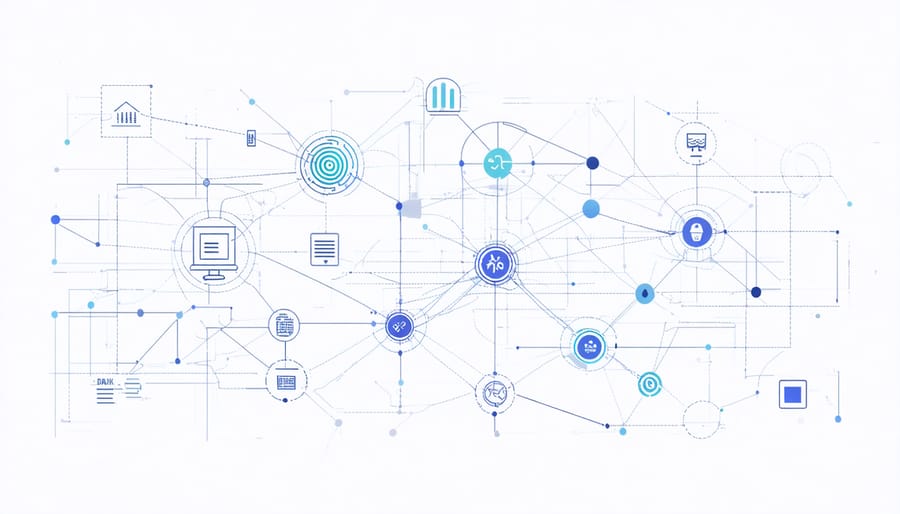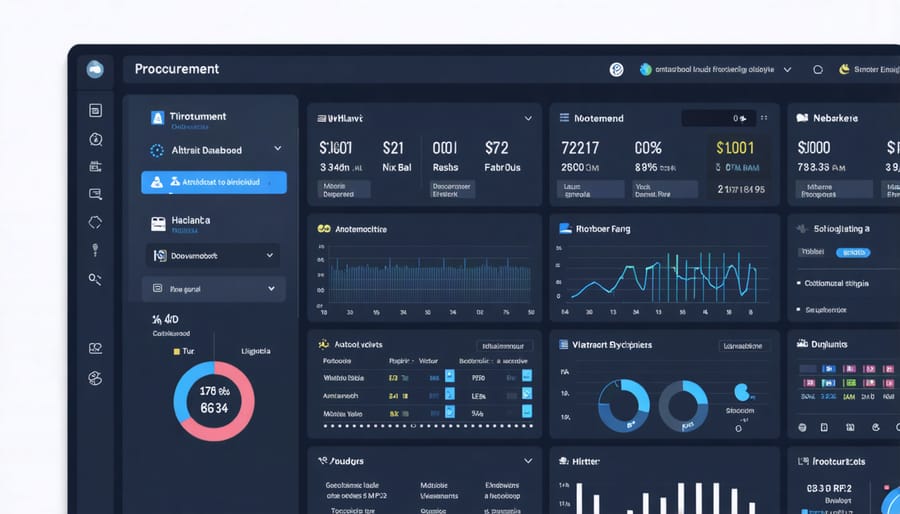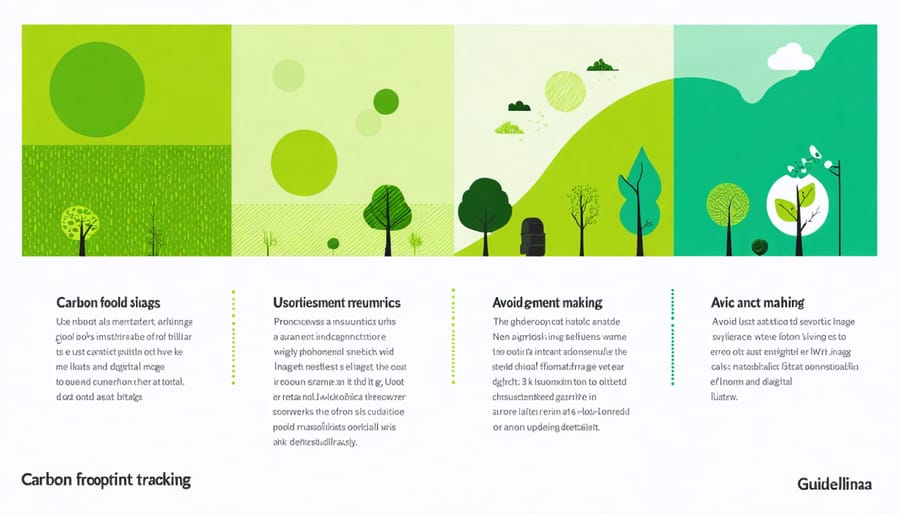Digital transformation revolutionizes procurement in construction, delivering unprecedented efficiency and cost savings across the industry. Modern procurement innovations slash processing times by 70% while reducing errors by 85%, fundamentally reshaping how construction firms source materials and manage supplier relationships.
Artificial intelligence and machine learning now automate supplier evaluation, predict material costs, and optimize inventory levels with remarkable precision. Real-time analytics platforms enable procurement teams to make data-driven decisions, identifying cost-saving opportunities and supply chain risks before they impact project timelines. For more on how similar innovations are affecting the industry, see our coverage on how AI is revolutionizing construction.
Leading construction firms implementing digital procurement solutions report average cost reductions of 12-18% and procurement cycle times decreased by 30-50%. These innovations transform traditional procurement bottlenecks into strategic advantages, enabling rapid supplier onboarding, automated compliance monitoring, and dynamic pricing optimization.
By integrating blockchain technology and smart contracts, innovative procurement systems ensure transparent, tamper-proof transactions while automatically enforcing contract terms and compliance requirements. This technological revolution in procurement not only streamlines operations but fundamentally enhances project delivery certainty and stakeholder confidence.
The Digital Revolution in Construction Procurement
AI-Powered Supplier Selection
Artificial Intelligence has revolutionized supplier selection in construction procurement, offering unprecedented accuracy and efficiency in vendor evaluation. Modern AI algorithms analyze vast datasets of supplier performance metrics, financial stability indicators, and project delivery records to identify optimal partners for construction projects.
These intelligent systems evaluate multiple criteria simultaneously, including pricing competitiveness, quality standards compliance, safety records, and environmental certifications. By processing historical performance data, AI can predict potential risks and supplier reliability with remarkable precision, helping procurement teams make more informed decisions.
Leading construction firms are implementing machine learning models that continuously learn from procurement outcomes, refining their selection criteria based on actual project success rates. These systems can flag potential issues before they become problems, such as identifying suppliers with declining performance trends or those showing signs of financial instability.
The technology also excels at matching specific project requirements with supplier capabilities. For instance, when selecting suppliers for complex infrastructure projects, AI systems can identify vendors with relevant experience in similar projects, appropriate certifications, and proven track records in meeting stringent technical specifications.
Real-time market analysis capabilities enable procurement teams to optimize timing and negotiate better terms. The AI-driven approach not only reduces the time spent on supplier evaluation by up to 70% but also significantly minimizes the risk of supplier-related project delays and quality issues.

Blockchain for Supply Chain Transparency
Blockchain technology is revolutionizing procurement transparency in the construction industry by creating immutable digital records of every transaction and material movement. This distributed ledger system provides an unprecedented level of accountability and traceability throughout the supply chain, from material sourcing to final delivery.
Construction firms implementing blockchain solutions report significant improvements in material tracking accuracy and supplier verification. The technology creates a permanent, time-stamped record of each transaction, making it impossible to alter documentation retroactively without detection. This feature is particularly valuable for projects requiring strict compliance with building codes and sustainability certifications. To explore more about blockchain’s impact on construction, the article on blockchain technology provides a detailed insight.
A notable implementation by Turner Construction demonstrates blockchain’s practical benefits. Their pilot program reduced documentation errors by 85% and shortened payment processing times by 40%. The system enabled real-time tracking of critical materials and automated supplier verification, significantly reducing delays and potential fraud risks.
Key advantages include enhanced material provenance verification, automated compliance checking, and streamlined payment processes. Smart contracts, embedded within the blockchain, automatically execute predetermined agreements when specific conditions are met, reducing administrative overhead and potential disputes.
However, successful implementation requires careful consideration of infrastructure requirements and stakeholder training. Industry leaders recommend starting with small-scale pilots before full-scale deployment, focusing on high-value materials and critical supply chain segments initially.
Real-Time Data Analytics in Procurement

Predictive Analytics for Material Forecasting
Predictive analytics has revolutionized material forecasting in construction procurement, enabling companies to optimize inventory levels and anticipate material needs with unprecedented accuracy. By leveraging historical project data, market trends, and real-time consumption patterns, construction firms can now make data-driven decisions that significantly reduce waste and improve project efficiency.
Advanced algorithms analyze multiple data points, including seasonal demand fluctuations, supplier lead times, and project timelines, to generate accurate forecasts for material requirements. This systematic approach helps prevent both overstock situations and critical shortages that could delay project completion.
For example, a leading construction firm implemented predictive analytics and reduced their inventory carrying costs by 23% while maintaining a 98% material availability rate. The system continuously learns from past procurement patterns and adjusts forecasts based on actual usage, weather conditions, and market variables.
Key benefits of predictive analytics in material forecasting include:
– Reduced storage costs through optimized inventory levels
– Minimized emergency purchases and rush delivery fees
– Better negotiating position with suppliers through planned purchasing
– Improved cash flow management
– Enhanced project planning capabilities
Modern predictive analytics platforms integrate with existing enterprise resource planning (ERP) systems, providing real-time insights through intuitive dashboards. Project managers can access accurate demand forecasts, set automated reorder points, and receive early warnings about potential supply chain disruptions.
To maximize the effectiveness of predictive analytics, construction companies should ensure clean data input, regular system calibration, and proper staff training. When implemented correctly, these systems typically achieve ROI within 12-18 months through reduced carrying costs and improved operational efficiency.
Sustainable Procurement Innovation

Carbon Footprint Tracking Tools
Digital carbon footprint tracking tools have revolutionized how construction companies monitor and reduce their environmental impact throughout the procurement process. These sophisticated platforms integrate with existing procurement systems to provide real-time data on carbon emissions across the supply chain, from material extraction to final delivery.
Leading solutions now offer features such as supplier carbon scoring, automated emissions calculations, and predictive modeling to optimize procurement decisions. For example, advanced analytics can compare different suppliers’ carbon footprints and suggest alternatives that maintain quality while reducing environmental impact. Many tools also incorporate blockchain technology to ensure data accuracy and create transparent audit trails for environmental compliance reporting.
Construction firms implementing these tools typically report 15-20% reductions in their procurement-related emissions within the first year. The data collected also supports Environmental Product Declarations (EPDs) and helps meet increasingly stringent sustainability requirements in building certifications and government contracts.
Key features to look for include integration capabilities with BIM systems, real-time reporting dashboards, and supplier performance tracking. These tools are becoming essential as the industry moves toward carbon-neutral construction practices and stricter environmental regulations. For further understanding of sustainable strategies in the industry, consider exploring the strategies for sustainable construction.
Case Study: Digital Procurement Success
Turner Construction’s implementation of a digital procurement platform in 2019 demonstrates the transformative potential of modernized procurement systems. The company integrated a cloud-based solution that automated their supplier selection, material ordering, and payment processes across 30 major projects in the Western United States.
The implementation resulted in a 40% reduction in procurement cycle times and a 25% decrease in administrative costs within the first year. Real-time tracking capabilities enabled project managers to monitor material deliveries and inventory levels accurately, reducing costly delays and stockouts by 60%.
Key success factors included comprehensive staff training, phased implementation across projects, and strong supplier engagement. Turner established a dedicated digital procurement team to manage the transition and provide ongoing support. The platform’s analytics capabilities helped identify cost-saving opportunities, leading to an additional 15% reduction in material costs through improved vendor negotiations and bulk purchasing.
This digital transformation has since become a benchmark for large-scale construction procurement modernization, demonstrating how strategic technology adoption can deliver measurable operational improvements and financial benefits.
Innovation in procurement continues to reshape the construction industry through digital transformation, strategic sourcing, and automated processes. As technology evolves, we can expect further integration of AI-driven analytics, blockchain solutions, and real-time collaboration platforms. Success in modern procurement requires embracing these innovations while maintaining focus on sustainability, cost efficiency, and risk management. Organizations that adapt to these changes will gain significant competitive advantages in the evolving construction landscape.

